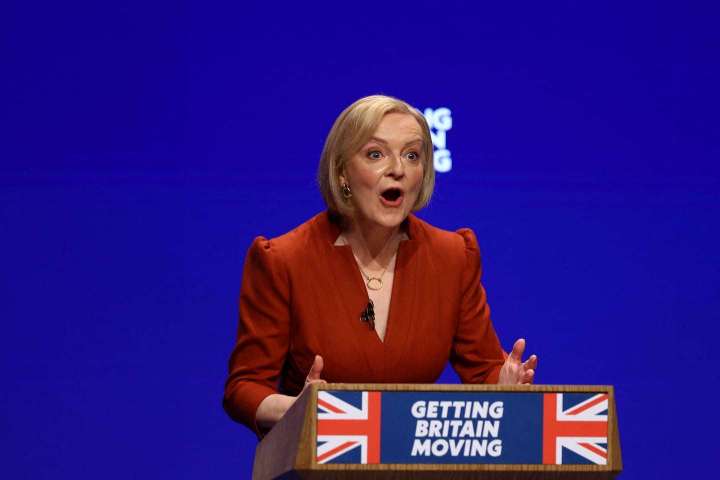LONDON — Prime Minister Liz Truss on Wednesday sought to shore up her authority after a brutal first month in office by asserting that while not everyone favors the changes her new government is pushing, “everyone will benefit from the result — a growing economy and a better future.”
U.K. Prime Minister Liz Truss defends first month in office amid protests

The Conservative Party conference, featuring a new prime minister, was a moment the party had hoped would mark a fresh start after the many scandals of her predecessor, Boris Johnson. Instead, Truss had to defend the first weeks of her premiership, already marked by historic economic volatility, a revolt within her party and voters turning away from Conservatives in droves.
“I’m ready to make the hard choices,” she said. She warned of “stormy days” ahead but insisted that Britain needs to “do things differently” and that “whenever there is change, there is disruption.”
“I am determined to take a new approach and break us out of this high-tax, low-growth cycle,” she told the party faithful gathered in Birmingham, England.
Referring to the protesters later in her speech, she spoke dismissively about an “anti-growth coalition” made up of a broad swath of people in the country, including opposition politicians, “the militant unions, the vested interests dressed up as think tanks, the talking heads, the Brexit deniers, Extinction Rebellion and some of the people we had in the hall earlier.”
“The fact is they prefer protesting to doing. They prefer talking on Twitter to taking tough decisions,” she said. “They taxi from North London townhouses to the BBC studio to dismiss anyone challenging the status quo. From broadcast to podcast, they peddle the same old answers. It’s always more taxes, more regulation and more meddling. Wrong, wrong, wrong.”
Truss came into office with a lot to prove. Although she had a somewhat prominent role as foreign secretary during the war in Ukraine, she wasn’t known to the British public the way Johnson — a colorful former mayor of London and newspaper columnist — had been before he took the helm.
Truss was propelled not by a general election but by a leadership contest within her party. Even then, she wasn’t the first choice of Conservative Party lawmakers, and some of the grass-roots party members who rallied around her have admitted they already missed Johnson.
Any momentum Truss had as incoming prime minister was cut short after two days by the death of Queen Elizabeth II. The new prime minister joined the new king in touring the four nations of the United Kingdom, but she played a marginal role.
When attention eventually returned to politics, things took a dramatic turn for the worse. Her government’s plan to grow the economy through tax cuts primarily aimed at the wealthy, to be funded by billions in borrowing, sent investors scrambling to dump British assets. The pound sank to an all-time low against the dollar. The Bank of England had to intervene to quell a financial market revolt.
Only after 10 days of economic turmoil and under intense pressure from her party did Truss reverse course, announcing Monday that she would abandon the most controversial element of her economic plan: a proposal to scrap the top rate of income tax.
The pound has since rebounded. But divisions within the Conservative Party remain, as the conference proceedings this week have made clear. Home Secretary Suella Braverman on Tuesday lashed out at those within the party who “staged a coup” that “undermined the authority of our prime minister in an unprofessional way.”
Meanwhile, public opinion of the Conservative Party has nosedived, falling by 20 to 30 points in the past two weeks.
“This is the most dramatic polling shift in my lifetime,” said Chris Curtis, head of political polling at Opinium research.
The Conservatives have “lost the perception as them being the economically competent party — it’s as simple as that,” Curtis said.
A poll published Tuesday night showed the opposition Labour Party leading the Conservatives by 38 points in the “red wall” areas in northern England that swung behind Conservatives in the 2019 election.
If an election were held today, pollsters say the Labour Party would win its biggest majority.
“What this shift in the polls shows is that the British electorate is increasingly volatile. It’s decreasingly aligned to party attachment. Voters will swing from one party to the next,” said Will Jennings, a professor of political science at the University of Southampton.
Politics in Britain are much less polarized than in the United States. That’s partly because of Brexit, which prompted many people to walk away from parties they had supported for decades and to instead think of themselves as “leavers” or “remainers” — labels that crossed party lines. Now that Brexit is a done deal, voters are open to being swayed by other concerns.
That volatility means the pendulum could swing back and forth a number of times before the next election, which could be as far off as January 2025, and so neither the Conservative Party nor Truss is in immediate danger.
Still, the Conservatives are known for ruthlessly ditching leaders who no longer seem like vote winners. Johnson was ousted halfway through his term in office, following a number of scandals, even though he led his party to a whopping majority in 2019.
If Conservatives think Truss will drag them down, she could find herself booted out just like Johnson.
“She’s in a vulnerable, delicate situation,” Jennings said. “If Conservatives stay at the current levels in the polls, [members of Parliament] will get very worried. One should never presume too much about political futures, but it’s certainly true she’s in a difficult spot. Recovering support of her MPs and voters will be a tremendous challenge.”






